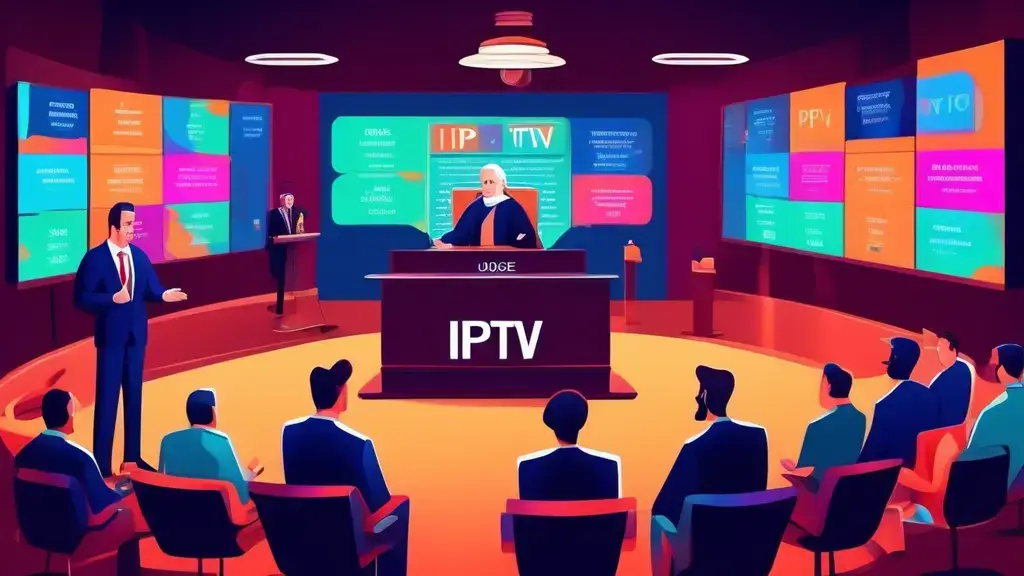
The IPTV validity in Canada depends entirely on licensing and regulatory compliance. While the IPTV technology itself is completely legal, material distribution and provider licensing determines whether specific services follow Canadian broadcasting laws. This broad guide explains the legal scenario for Canadian audiences in 2025.
CRTC Regulations and Legal Infrastructure
Canadian radio-television and telecom commission (CRTC)
Legal IPTV services should be licensed by Canadian Radio-TeliVization and Telecom Commission (CRTC) and follow the installed broadcast regulations.
CRTC requirements for legal ipTV:
- Broadcast license issued by regulatory officers
- Material Distribution Agreement with Copyright Holders
- Canadian Content Quota Meeting Cancan Requirements
- Financial contribution to Canadian Material Development Fund
- Broadcasting act compliance
In Canada, IPTV services are regulated under the Broadcasting Act with Oversight from CRTC, ensuring consumer protection and material standards.
Legal compliance requirements:
- Proper licensing for material distribution rights
- Revenue reporting to Canadian officials
- Consumer Protection Standards and Customer Service
- Exhibition features for disabled audience
Licensed versus unlicensed services
Licensed IPTV services have a legal right to broadcast materials and follow the law, while unlicensed streaming services do not have these rights and can be risky to the audience.
Legal Services Features:
- CRTC Registration and Regulatory approval
- Transparent ownership and business operations
- Official partnership with material creators
- Customer aid and service guarantee
Legal IPTV services in Canada
Major licensed provider
Bell Fib TV provides comprehensive IPTV services with full CRTC compliance and comprehensive Canadian materials.
Licensed Canadian IPTV option:
- Bell Fib TV – Complete IPTV solution with Live TV and VOD
- Rogers ignited TV – cable and internet -based streaming
- Shaw Blueway TV – Regional IPTV Service (Now Rogers)
- Telus Optic TV – Fiber for Western Canada – Appeared IPTV
International legal services
Legally operated global streaming platforms in Canada with appropriate licensing agreements.
Licensed International IPTV:
- Netflix Canada – licensed streaming with Canadian material requirements
- Amazon Prime Video – According to CRTC rules
- Disney+ Canada – Full licensing for Canadian distribution
- Crave – Bell Media’s legal streaming platform
Membership-based legal option
Premium IPTV services providing licensed material with transparent pricing and customer safety.
Legal Membership Facilities:
- Clear pricing structure without hidden fees
- Official customer aid channel
- Material license transparency and legal compliance
- Consumer rights protect policies
Illegal IPTV services and risk
Identification of illegal services
Unauthorized IPTV services work without proper licensing, putting users at legal and safety risks.
Red flag of illegal services:
- Extremely low pricing compared to legal options
- No customer aid or official contact information
- Cryptocurrency payment only or suspicious payment methods
- Material from many countries without licensing verification
Legal results for users
Users risk $ 25,000 fine and ISP ban by Rogers or Telus when using unauthorized IPTV services.
Possible legal punishment:
- Copyright violation fined up to $ 25,000 for personal use
- Internet service ends by Canadian ISP
- Legal action from material rights holders
- Criminal allegations for commercial theft operation
2025 enforcement operations
In 2025, 1,500 illegal IPTV services were discontinued, increasing regulatory enforcement against unauthorized providers.
Recent enforcement trends:
- Shutdown of illegal streaming services increased
- ISP cooperation in blocking unauthorized materials
- International cooperation for border crossing
- User tracking and potential legal results
Copyright Law and IPTV
Canadian copyright act
Copyright protection extends to streaming material, making unauthorized distribution illegal under Canada’s law.
Copyright is involved in violations:
- Copyright material streaming without proper licensing
- Distributing protected materials through IPTV system
- Pardoning material protection system and DRM
- Operations for commercial theft benefits
Material licensing requirements
Legal IPTV providers should obtain specific rights for material distribution in Canada.
Licensing component:
- Broadcasting rights from material creators
- Geographical licensing for Canadian distribution
- Rights of replacement together for local advertising
- On-demand rights for catch-up and VOD services
Proper use and personal view
Personal use exceptions are the limitations when it comes to streaming copyright content.
Legal Personal Uses:
- Financially purchased material streaming for individual devices
- Timetable of programming
- Transfer of material owned material for personal convenience
- Backup copies of legitimately acquired media
How to identify legal IPTV services
CRTC registration verification
Regulatory compliance can be verified through the official CRTC database and registration records.
Methods of verification:
- Search for CRTC website licensed broadcasters
- Official trade registration in Canadian database
- Transparent ownership and contact information
- Public financial reporting and regulatory filing
Legitimate business practices
Legal IPTV services work transparently with appropriate business practices and customer security.
Legal Services Indicators:
- Official websites with company information
- Customer service with Canadian phone number
- Conditions of service as per Canadian consumer protection
- Privacy policies complete Canadian privacy laws
Pricing and payment transparency
Appropriate pricing refers to the cost of legal material licensing and service operations.
Appropriate pricing characteristics:
- Market pricing compared to legitimate competitors
- Transparent billing with detailed service detail
- Standard payment methods including credit card and bank transfer
- Tax compliance with GST/HST collection where applied
Consumer protection and safety
Security risk of illegal services
Unauthorized IPTV services expose users to significant cyber security threats and privacy risks.
Security threats include:
- Malware distribution through streaming applications
- Personal and financial information data stolen
- Unprotected unsafe connection for blocking
- Identification stolen from compromised user accounts
Privacy concerns
Illegal streaming services often lack proper privacy protection and data security measures.
Privacy Risk:
- Watching habit trekking without consent
- Personal information with third parties
- Payment data risk through unsafe systems
- Location tracking and user surveillance
Financial security
Legal services provide consumer protection and support for billing disputes and service issues.
Consumer Safety Measures:
- Regulated billing practices with dispute resolution
- Service level agreement performance guarantee
- Cancellation rights under consumer protection laws
- Return policies for unsatisfactory service
ISP and Government Enforcement
Internet service provider work
Canadian ISPs collaborate with authorities to block rapid illegal IPTV services and protect copyright.
ISP Enforcement methods:
- Blocking known illegal services
- Deepest packet inspection to identify unauthorized streaming
- Frequent account expiration for copyright violations
- Tipping
Government crackdown initiative
Federal and provincial officials coordinate efforts to deal with illegal IPTV distribution.
Enforcement Strategies:
- International cooperation with material rights holders
- Financial investigation targeting illegal service operators
- Criminal prosecution for large -scale piracy operations
- Public awareness campaign about legal streaming options
Reporting of illegal services
Citizens can report illegal IPTV services to the officers suitable for investigation.
Reporting channel:
- CRTC Grievance System for Broadcasting Violation
- RCMP Cyber Crime Division for Criminal Activities
- Industries Association representing material creators
- ISP misconduct department for network policy violations
Best practice for legal ipTV use
Service selection guidelines
Choose a prestigious provider with clear legal compliance and transparent business practices.
selection criteria:
- CRTC licensing verification before membership
- Company reputation and customer review
- Service reliability and customer aid quality
- Material validity and licensing transparency
Avoid legal risks
Responsible viewing habits protect users from potential legal consequences and safety threats.
risk mitigation:
- Research provider completely before subscribing
- Avoid suspected cheap services without proper licensing
- Use official payment methods and avoid cryptocurrency-level services
- Report suspicious services to appropriate officers
Be informed about the rules
Legal landscape changes require ongoing awareness about Canadian broadcasting rules and enforcement.
information sources:
- CRTC announcements and regulator updates
- Industry news from reputed technology publications
- Legal advice from consumer protection agencies
- Official government communication about copyright enforcement
Future of IPTV regulation in Canada
Modernization broadcasting act
The CRTC continues to implement the modern broadcasting act with updated rules for streaming services.
Regulatory Development:
- CRTC Authority expanded on streaming platforms
- Canadian material requirements for global services
- Revenue sharing responsibility for international providers
- Increased consumer protection measures
Technology and enforcement
Advanced identification methods improve identification and blocking of illegal IPTV services.
Enforcement Technology:
- Automated material recognition system
- Network traffic analysis for illegal currents
- International Cooperation Forum for Enforcement
- Blockchain verification for valid material distribution
Industry cooperation
Registrar cooperation between regulators, ISPs and content creators strengthens legal outline enforcement.
collaborative effort:
- Industry work group on theft prevention
- Common threats about illegal services intelligence information
- Jurisdiction in coordinated enforcement operations
- Consumer education initiative about legal options
Options for illegal IPTV
Legal streaming options
Valid options provide comprehensive entertainment without legal risk or safety concerns.
Canadian Legal Options:
- CBC Gem – Free Streaming with Canadian ingredients
- Ctv.ca – Network programming and live stream
- Global TV App – Legal Access to Global Ingredients
- Tuby Canada – Independent, Advertising – Assistant Legal Streaming
Comparison of membership services
Cost-affect legal options often provide better value than illegal services when considering safety and reliability.
Service Comparison:
- Netflix Canada – $ 16.49/month for premium content
- Amazon Prime Video – $ 9.99/month with additional benefits
- Disney+ Bundle – Comprehensive Family Entertainment
- Longing – Premium Canadian and International Materials
Core-cutting solutions
Legal options for traditional cables provide flexibility while maintaining regulatory compliance.
Legal Cord-Cotting:
- Over-the-air antenna for free local broadcasting
- Network apps with certification through cable membership
- Legal IPTV bundle from licensed providers
- Combination membership for comprehensive coverage
conclusion
The IPTV is legal in Canada when licensed, provided by CRTC-analog services that respect copyright and broadcasting rules. Use only registered providers with Canadian telecom regulators to avoid legal risks and security weaknesses.
The difference between legal and illegal IPTV services is obvious: valid providers obtain appropriate licenses, compliance with Canadian material requirements, and consumer protection measures work transparently with measures. Illegal services expose users to significant legal punishment, security risk and incredible service quality.
Canadian audiences have several legal IPTV options available, working under proper licensing agreements ranging from major telecom providers to international streaming platforms.
Consumers protect themselves from potential fines, legal action and cyber security threats by selecting legal services, supporting the Canadian broadcasting ecosystems and material creators.
Be informed about the CRTC rules and select only verified, licensed IPTV providers to ensure safe, legal and reliable streaming experience in Canada.


